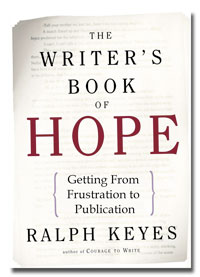
Having helped writers face their demons of fear in his acclaimed The Courage to Write, Keyes now turns to the frustration that invariably follows. Frustration is as much a part of the writing process as similes and semicolons, he suggests. If you’re not frustrated, Keyes tells readers, you’re not paying attention. Any serious writer gets discouraged. This is a sign of seriousness; evidence that their reach is exceeding their grasp. Drawing on his long experience as a writer and teacher of writing, Keyes discusses how writers cope with day-to-day frustration, and the struggle to publish. He provides fresh insight into the mind-set of publishers, suggests ways to deal with “discouragers,” and find the “encouragers” every writer needs to keep hope alive. Keyes details the many unconventional tactics writers come up with to kindle the flame of hope, and concludes with well-informed thoughts on why there has never been a better time to write and to publish the results.
Readers of Ralph Keyes’s new book will find the same encouraging tone, but fresh material and a different thrust. The Courage to Write helped writers face their demons. The Writer’s Book of Hope helps them stay the course. Keyes doesn’t try to talk writers out of feeling discouraged. He does not raise false hopes about publication being just around the corner. He does show readers what’s involved, discuss ways to cope with frustration, and give tangible reasons not to put down their pen or computer mouse to stay the course – realistic grounds for hope.
Topics that The Writer’s Book of Hope explores include:
- why all writers need encouragement
- why AFD Syndrome (anxiety/frustration/despair) is normal, even desirable
- prominent authors whose early prospects looked dim
- dealing with discouragers
- finding encouragers
- exorcising excuses (e.g., age, lack of time, or inspiration, or degrees)
- ways to keep hope alive
- publishing demystified
- unprecedented new ways to get words in print
- writing and ecstasy
A word or two of encouragement can keep writers at their desks when all seems for naught. At those times, reassurance is far more helpful than marketing tips or style pointers. In the long run, suggestions on how to write may be less helpful than thoughts on how, and why, to keep writing. Existing books on writing seldom address this need at all. None do so as their theme. The Writer’s Book of Hope does.
